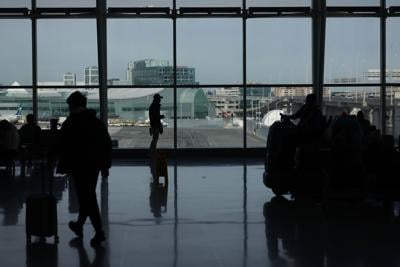In a unanimous ruling released Friday, the Supreme Court of Canada has upheld Canada’s air passenger protection regulations, shooting down an appeal by airlines of a 2022 federal court judgment.
A coalition of 16 international airlines, including Air Canada and Porter, had argued that the Canadian Transportation Agency overstepped its authority in creating the Air Passenger Rights Regulations, which compensate passengers for delays, cancellations and denied boarding.
The airlines╠řÔÇö and the International Air Transport Association (IATA) ÔÇö╠řargued that the regulations should be struck down╠řfor international flights, because Canada has already signed the Montreal Convention, an international air passenger protection treaty.
In a win for air travellers, the Supreme Court of Canada has upheld rules that bolster compensation for passengers subjected to delays and damaged luggage on international flights. (Oct. 4, 2024 / The Canadian Press)
“In signing on to the╠řConvention╠řÔÇŽ there is no indication that Canada (or any other state party) agreed to forego its ability to provide for minimum standards of treatment for passengers within its jurisdiction,” the court wrote in its ruling.
The Montreal Convention has been law in Canada since 2001. The APPR was put into place in 2019.
In a press release, passenger rights advocate Gabor Lukacs, who was an intervener in the case, praised the ruling.
“The decision upholds Canadian passengers’ right to be treated fairly,” said Lukacs, founder of Air Passenger Rights. “I am grateful╠řthat the court rejected the airlines’ attempt to close the door and nail it shut on╠řpassenger protection in Canada.”
Lukacs, who has long criticized Canada’s Air Passenger Rights Regulations (APPR) as inadequate, said the ruling could provide more momentum for a push to make the APPR stricter, similar to the regulations in force in the European Union.
“The court’s decision breathes new life into the initiative to revamp the APPR and correct╠řits many shortcomings,” said Lukacs. “Canada needs an EU-style regime. It has been╠řtested and it works.”
In a written statement, the Canadian Transportation Agency (CTA) said it was gratified by the ruling.
“The Supreme Court of Canada’s decision brings certainty to Canada’s passenger protection regime and confirms air carriers’ minimum obligations to pay compensation for flight disruptions and lost and damaged baggage,” the CTA said.
Federal transport minister Anita Anand said the ruling backed up the government’s efforts to protect passengers.
“In 2019, our government was the first in CanadaÔÇÖs history to protect passengers by introducing legislation. Today, the Supreme Court ruled in favour of passengers and our view that passengers need protection. We will always stand up for Canadians and their rights as travellers,ÔÇŁ said Anand in a written statement.
In a statement, the IATA said it was disappointed with the decision, and called on the federal government to take a broader approach to fixing air travel disruptions, rather than focusing on airlines.
“Protecting the interests of passengers is best achieved through a safe, efficient journey where disruptions are minimized. While airlines play a critical role in this, the federal government needs to focus its efforts on improving the overall air travel system, especially in the parts of the value chain which are directly under its control,” the IATA said.
If the airlines’ appeal had been successful, it would have been a heavy blow for consumer protection in all industries in Canada, not just for airline passengers, argued John Lawford, special counsel at the Public Interest Advocacy Centre (PIAC).
ÔÇťIf it had gone the other way, there would have been a questioning of every administrative or ombudsman type system meant to compensate consumers for poorly-delivered essential services,” said Lawford. A decision in the airlines’ favour, he added, could have made the current CTA backlog of 78,000 air passenger complaints even worse. The PIAC was also an intervener in the case.
Lawford called the decision a “real landmark.”
ÔÇťThe airlines donÔÇÖt love you, so we need the APPR to keep in the front of their mind that what theyÔÇÖre transporting is people, and people have to be treated like people, not like baggage,” said Lawford.
Correction ÔÇô Oct. 4, 2024
This article was corrected from an earlier version that said the Supreme Court could have struck Air Passenger Protection Regulations for domestic flights, in addition to international flights. In fact, the case was only about international flights. Incorrect information was supplied to the Star.





























To join the conversation set a first and last name in your user profile.
Sign in or register for free to join the Conversation